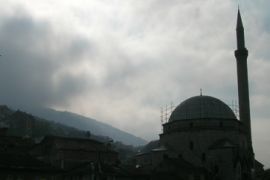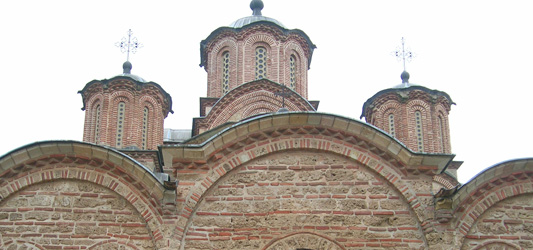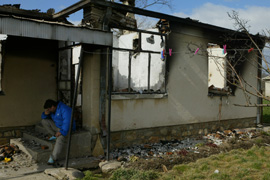War of words in Serbs’ ‘Jerusalem’
The real extent of religious division in Kosovo is disputed by both sides.

 |
| Many Serbs see Orthodoxy as part of their national identity |
Kosovo’s troubles are sometimes portrayed as a dispute between the Albanian Muslim majority and the minority Serb Orthodox Christians.
The importance of western Kosovo as “the cradle of Serb Orthodoxy” has been emphasised by those seeking to keep the province, which has been administered by the United Nations since 1999, as part of Serbia.
Alexander Anderson, the Kosovo project leader for the International Crisis Group, says that some Serbs had been using religion to undermine talks on the future status of the region.
“We have a constant drip, drip of statements about Serbs being under threat and attacks on Serb Orthodox sites,” he said.
| Al Jazeera in Kosovo |
“One also hears talk about the risk of Kosovo being at risk of becoming a new base for al-Qaeda in the region, it is all very exaggerated.”
Three religions – Islam, Orthodoxy, and Catholicism – have long existed together in Kosovo.
A large majority of Kosovo Albanians consider themselves, at least nominally, to be Muslim, while a small minority, about 60,000 people, are Roman Catholic.
Most Kosovo Serbs, even those who are not active religious believers, consider Orthodoxy to be an important component of their national identity.
Relaxed approach
However in an exclusive interview, Naim Ternava, the Grand Mufti of Kosovo, told Al Jazeera that there had never been a conflict between different faiths in the area.
“There has never been an inter-faith conflict in Kosovo and there never will be this kind of conflict,” he said.
| Related link | ||
|
|
Indeed most Kosovo Albanians do not define their national identity through religion, but through language and have a relatively relaxed approach towards the observance of many elements of Islam.
Likewise Muslim leaders and Islamic theology did not play a significant role in the eight-year unarmed resistance to Serb authority and the conflict that took place in 1998 to 1999.
When asked about the situation in Kosovo the Serb Orthodox church in Belgrade referred Al Jazeera to a website which details the destruction of 35 religious sites during violent unrest in 2004.
It describes attacks on a number of religious sites by Kosovo Albanians in 2004 as “ethnic cleansing” and “Kosovo’s Kristallnacht”, in reference to a pogrom against Jews in Germany in 1938.
“Every example of vandalism is seized on by the Serbs,” Anderson says. “In fact, I think that Kosovo Albanian society looks back on the March 2004 riots with some embarrassment.
“They had to pay for the rebuilding out of their own pockets … and they want to be seen as respectable to the international community.”
Guarantees
 |
| Violence broke out between Kosovo Albanians and Serbs in 2004 |
Naim Ternava says he was among the first people to speak out against the attacks on monasteries in 2004.
“The Quran tells us not to burn mosques or monasteries,” he says.
“During the war 218 mosques were burnt and we didn’t say this was an inter-faith conflict.”
Bishop Artemije, the spiritual leader of Kosovo’s Serbs has previously warned against international support for independence.
“I wonder how it is possible that the international community and the democratic world tolerate violations of religious freedoms and the extermination of Christianity, while they are considering the creating of an independent Kosovo managed by criminals and jihad supporters,” he said during a visit to Canada in 2006.
The plan for Kosovo’s future status by Marti Ahtisaari, the UN envoy to the area, does in fact provide extensive human rights guarantees for the Serbs and the Serb Orthodox church that the International Crisis Groups says “go far beyond European standards.”
The Grand Mufti told Al Jazeera that he did not believe there would be any “troubles or conflict” in Kosovo if independence was granted.
“Everybody is wanting Kosovo to be independent. I think it is the only way for all the communities to have a better life in Kosovo,” he said.

